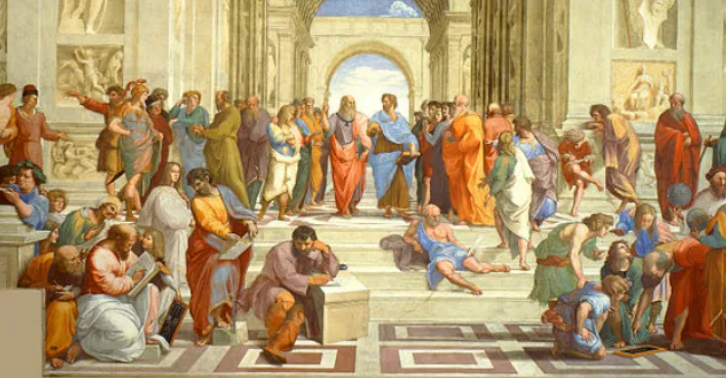
Word of the Day: Symposium
Today’s word of the day, courtesy of Merriam-Webster, is symposium. Symposium means “a meeting or conference for the discussion of some subject, especially a meeting at which several speakers talk on or discuss a topic before an audience” or “a collection of opinions expressed or articles contributed by several persons on a given subject or topic” or “an account of a discussion meeting or of the conversation at it” (https://www.dictionary.com/browse/symposium).
The word as a common noun appears in English in “1711, from Latin symposium ‘drinking party, symposium,’ from Greek symposion ‘“drinking party, convivial gathering of the educated’ (related to sympotēs ‘drinking companion’), from assimilated form of syn- ‘together’ (see syn-) + posis ‘a drinking,’ from a stem of Aeolic ponen ‘to drink’ (from PIE root *po(i)- ‘to drink’).
“The symposium usually followed a dinner, for the Greeks did not drink at meals. Its enjoyment was heightened by intellectual or agreeable conversation, by the introduction of music or dancers, and by other amusements. [Century Dictionary]
“Reflecting the Greek fondness for mixing wine and intellectual discussion, the modern sense is especially from the word being used as a title for one of Plato’s dialogues.
“Earlier in English as ‘account of a gathering or party’ (1580s, the title of Plato’s work). The sense of ‘a meeting on some subject’ is from 1784. The Greek plural is symposia, an attendee is a symposiast, and the leader of one is a symposiarch (c. 1600 in English)” (https://www.etymonline.com/search?q=symposium).
Merriam-Webster says, “When you hear the word symposium, you may—quite understandably—envision conferences full of intellectuals giving heady presentations on various arcana. But it was drinking, more than thinking, that drew people to the original symposia and gave us the word. . . . Originally, English speakers only used symposium to refer to such an ancient Greek party, but in the 18th century British gentlemen’s clubs started using the word for confabs in which conversation was fueled by drinking. By the end of the 18th century, symposium had gained the more sober sense we know today, referring to meetings in which the focus is more on imbibing ideas and less on imbibing, say, mead” (https://www.merriam-webster.com/dictionary/symposium).
Before I retired, I was Professor of English. As such, I had occasion to attend conferences, though I didn’t go to a lot of them. But I remember how dedicated my MA advisor, Dr. Ed Stephenson, was to SAMLA, the South Atlantic Modern Language Association, meetings, which are generally held in Atlanta in November. These conferences are generally dominated by what they call “concurrent sessions” on a very wide variety of topics: Old and Middle English, Renaissance Poetry, 18th Century Drama, Marxist Criticism, sessions on a wide variety of foreign language literatures, and so forth. There special sessions for graduate student and undergraduate student papers.
I had a student who did an Honors Project on perceptions people have of people who use African-American Vernacular English (sometimes called Black English and sometimes called Ebonics). Her research was limited because I taught at a very small private college, and we didn’t have a lot of funding for such projects. But the paper she wrote and the presentation she created were quite good.
One of the requirements for the Honors program was that each Honors student was required to present their research. Most of the students accomplished this at a symposium sponsored by an organization for independent colleges and universities in South Carolina. Unfortunately, my student was not able to attend that gathering, so I had her submit her research to two conferences, a small linguistics conference at the University of Georgia, and SAMLA, hoping that one of them would accept it so that she could graduate with honors. Both accepted it.
The linguistics conference was, as I said, small, yet there must have been 40 or 50 people in the room where she presented her research, and it went very well. It went so well that after the session was over, several people asked her where she was doing her graduate work. The SAMLA session was specifically an undergraduate paper session, and it was not very well attended at all. But it accomplished the goal.
So there I was taking my undergraduate student from out little Christian college to a symposium. We did not, however, drink. But I thought of Dr. Stephenson, who died of lung cancer many years ago. He told me once that the reason he enjoyed going to SAMLA conferences was not the intellectual stimulation or the quality of the papers read. He enjoyed getting together with his colleagues from other institutions to drink in the evenings. Dr. Stephenson was a professor of Old and Middle English literature. I took classes from him on Middle English lit, Old English lit, and a seminar on Piers Plowman. But I had no idea that he was a classics professor as well.
Today’s image is from Raphael’s fresco The School of Athens (Scuola di Atene). It depicts what Raphael though a symposium would look like if a whole host of classical philosophers could have attended, including Epicurus, Averroes, Pythagoras, Parmenides, Socrates, Ptolemy, Plato, Aristotle, Heraclitus, Diogenes of Sinope, and Plotinus. I found it in a blog post (https://blogs.lse.ac.uk/impactofsocialsciences/2016/12/21/plato-and-aristotle-plan-a-symposium-a-surreal-take-on-academic-conferences/). It includes dialogue between Plato and Aristotle about hosting a symposium. The dialogue includes this:
“Plato replied:…. ‘And it is important to also consider the conference bar.’
“’Why is that?’ Aristotle wondered if he was displaying student tendencies.
“’Because, as Nicolson has found, this is where “the real work” of a conference is done; a convivial and relaxed bar is a place to make collaborations, catch up with colleagues, and devise new ideas,’ Plato explained.”
I think Dr. Stephenson would have agreed.